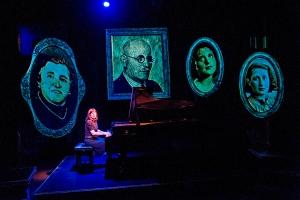Review of The Pianist of Willesden Lane at the St James Theatre
There's something fundamentally remarkable about Lisa Jura's story of resilience and the overwhelming power of music. Though the plot sounds like a Hollywood film, the fact that it's a true story and one that is told skilfully by her own daughter, Mona Golabek not only makes it all the more compelling but also provides a sense of attachment that makes for an utterly moving piece of theatre.
Jura is the eponymous pianist of Willesden Lane, having been saved from Vienna after her father won her a place on Kindertransport in a card game. After being selected by her parents to flee to England, her mother's words to never give up on her music hold true, and after encouragement from her hostel owner she wins a place at the Royal Academy of Music, becoming a concert pianist following the end of the Second World War.
The narrative is told by Golabek, also a concert pianist, and uses music to punctuate passages of grief, exultation and relief, creating a rich musical tapestry for which the drama can effectively sit against. Told in a relaxed and almost informal style, Golabek finds a warm rapport with the audience and through the simplicity of narration manages to hold them firmly in her hands for 100 minutes. It's deliberately low-key and it suits the space perfectly - never overacted she finds a sense of musical rhythm in the language, shifting appropriately in tone with a matter-of-fact grace. Her skills at the keyboard are extraordinary, overshadowing any holes in her acting, and each time she takes her seat at the piano bench you relax into her control of the music.
If the accounts of Kindertransport are a little glossed-over and the horrors of war are never fully conveyed, it is because Golabek's descriptions come through the words of her young mother and ring with the naivety of youth. Colourful portrayals of the characters she meets bustle with innocent joy against the horror of the situation, and the emotion is saved for extended passages at the piano, which takes centre stage in Hershey Felder's handsome and effective production.
At a time where Britain is currently wrestling with itself over its identity in Europe and its response to the worst humanitarian crisis since the Holocaust, the modern parallels are plain to see, and Golabek's moving thanks to a country who saved so many children doesn't fail to touch a chord.
Politics aside, it's the music that takes centre stage in this production, from the soft chords of Debussy's Clair de Lune to the stillness of Beethoven's Moonlight Sonata, performed with such agile grace and emotive chemistry that the notes themselves become a vital character in the narrative. By the time Lisa makes her debut at Wigmore Hall playing Grieg's Piano Concerto you feel the emotional release and find yourself overwhelmed by both the story and her delivery. A transcendent night of theatrical bliss.
Originally published on
